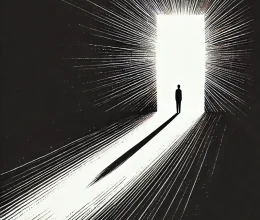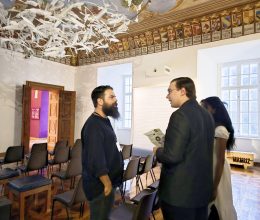
At this point, I will continue in Italian, addressing a cordial greeting to the Director of the Commision for relations with religious communities and groups, Darian Sotirovski and to the Rector of the Pontifical Oriental Institute Rev. David Nazar who have granted us the privilege of being with us tonight! At the same time, I thank all those who have contributed to the screening of the documentary film for the Bigorski Monastery which is a great monument of Macedonian culture and represents the soul and engine of spirituality in our country. Its history is so long and intense, and it is so rooted in our existence, that it almost constitutes a cultural encyclopedia of our country and of the spirituality of the Macedonian people.
All this thanks to the initiative and determination of the monks and nuns who contributed to its rebirth. Here I greet Father Kiril, the hieromonk of the Bigorski monastery and Sister Efimija of the Raicica monastery. I greet and introduce the Film Director Iko Karov, and I congratulate you on directing the film with provident lightness, discovering an immense heritage of culture, spirituality and creativity, thought and professionalism. Congratulations in the conducting, in the musical insertions of Composer Goran Trajkoski, which accompany the images in a masterly way and Branko Blazeski film editor.
I would like to remind you that the history of cinema is part of the history of our country. The first camera in the Balkans was brought to Bitola by the Manaki brothers at the beginning of the last century. Cinema has been able with modest bagets to relive, to tell, to express the feelings and values of our people. In delicate periods it was able to strengthencivic sense, and to raise major social issues. Above all, it was able to give emotions. About a thousand years ago at the time when Basil II (976 – 1025) ruled the great Roman Empire, and Samuel (976 – 1014) also reigned over the territory of today’s North Macedonia, in the beautiful and mystical slopes of Bistra, lived a monk named Jovan. This father was full of great goodness, sensible and wise, he took care of purity and humility of heart, always keeping in mind the words of the Lord: “Blessed are the pure in heart, for they shall see God” (Mt 5:8). It is said, that once Jovan saw some kind of strong and miraculous light among the trees, rising towards the sky like a pillar of fire. As he approached, he saw an icon floating with the face of St. John the Baptist. Overjoyed, Jovan fell to his knees and gave thanks to God, he took the icon with great devotionand managed to build it a suitable temporary home, a small chapel, in which he placed the icon and every day he prayed and thanked St. John the Baptist for the gift with which God blessed him. Thus began the millennial history of our monastery. During its existence, the Monastery survived many hardships. It suffered during the Ottoman Empire, when it was demolished and burned several times, and was also robbed and damaged by various groups of bandits who came from the west, but St. John the Baptist did not allow his holy icon to be destroyed.
The oblivion and desolation of the monastery continued during the communist period, with the cessation of religious functions and practices. After several decades, without religious practices and monastic life, the sanctuary was left in a silent and gradual spiritual decay, reduced to thefunction of a mere museum of deceased objects. Years had to pass before the conditions were created for his resurrection. Thus, finally, by the will of God and with the blessing of the competent bishops, the monastic life in the Bigorski monastery was revived in 1995 and since then it continues to flourish despite the fact that nowadays the world has radically changed. The speed of socio-cultural changes are becoming increasingly accelerated. Techniques, languages and tools impose new ways of expression and new communication ideas.
It must be said that the role played by the Internet and social networks in the amplification of prejudice is sometimes unprecedented. Freedom of expression comes with accountability, which is why codes of conduct are needed for the internet and social network policing, oftenmisused to attack places of worship and human dignity. But despite everything the Christian roots and the identity of the Macedonian people do not change. They are precious even if everything is changing. On the contrary, for this reason they become even more precious. The pandemic has strongly influenced many social, cultural and economic activities, and it has also been a very hard blow for cinema. But culture is an indispensable vector of development and of the soul. Culture does not stop even in the face of the injustices of war and natural disasters, culture is always ready to console and unite us. It crosses borders, limits that it does not contemplate, and is essential for recreating solidarity and conditions of peace.
Thank you for your attention!















